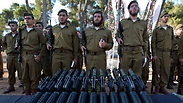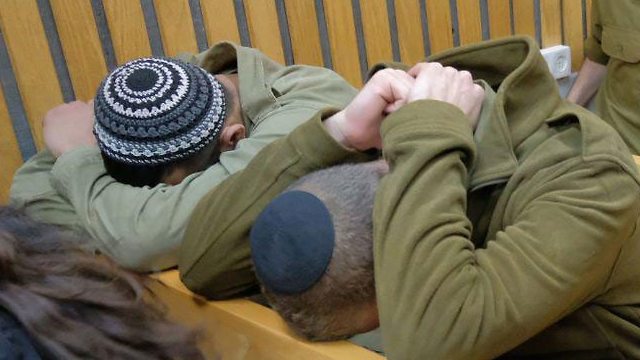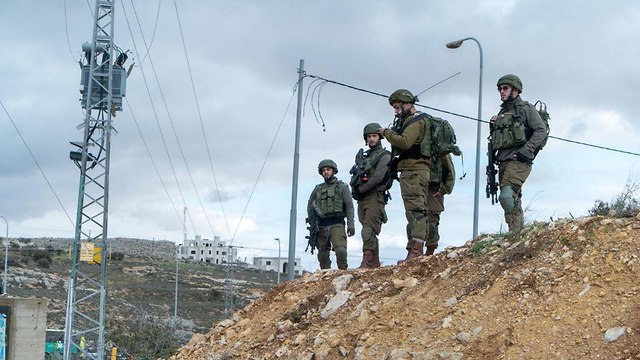
IDF commanders stand by troubled Haredi battalion
The Netzah Yehuda Battalion suffered multiple setbacks recently including 2 soldiers killed by escaped terrorists, an accidental weapons discharge incident and an assault on Border Police but officers are confident that the unique unit will overcome.
Segal is confident that the battalion will be able to overcome the blows it has suffered in recent months, which have included three attacks against the battalion at the hands of escaped terrorists, two dead soldiers, a murdered citizen, and an additional soldier who was critically wounded in a terrorist infiltration at the West Bank settlement of Beit El. In addition, there was a security incident involving the discharge of a bullet without any casualties, as well as the assault of Border Police officers by two members of the battalion when the Border Police officers tried to stop settlers from throwing rocks at Palestinians. The latest incident took place two weeks ago near Ramallah: an indictment will be filed in the coming days against four soldiers and an officer from Netzah Yehuda for violence against two Palestinian arrestees.
“As a graduate of the 51st battalion in southern Lebanon, I remember when our deputy company commander was killed in a confrontation with terrorists," Segal says. "Two days later, in another incident, the company commander and additional combatants were also killed. We were nevertheless left in the Reihan area and told to keep working hard.”
“On the other hand, there was a case in which a unit was relocated from its area due to severe incidents, and it was difficult for the unit to regain its senses. The approach should be: don’t give up, keep working hard, and successes will return once again. The battalion will recover, through an organized process of mentorship and learning from its mistakes”.
Major (Res.) Yossi Levi, who until recently served as a company commander at the battalion, is also convinced that the recent crisis will only make the battalion stronger: “This battalion has existed for 20 years and has never shied away from criticism. Rather, it knows how to build upon it. The battalion has been harshly criticized, but people know that the unit is also learning. The proof for this is that one of the women at the Givat Assaf junction said that the soldiers protected her with their own bodies. The battalion has had great achievements. In the past, in the Jenin area, the brigade commander at the time, Ghassan Alian, would not give missions to special units, but rather, only to the combatants of the Netzah Yehuda Battalion.”
“Difficult events of this sort only strengthen the battalion and raise motivation, which is higher in Netzah Yehuda than in Golani. In this battalion, there are the highest number of lone soldiers, without any family support, who left ultra-Orthodox families in order to contribute. There are 13 thousand alumni in the Netzah Yehuda Association and the battalion has also proven itself when it was sent to other areas, such as the Gaza Border, the Tulkarm area, and the Golan Heights.”
In the past two weeks, Levi visited the combatants of the battalion, and remarked: “I was sure that I would have seen them devastated, but they looked the opposite. Their motivation has only grown. They are sharper and more operationally and ethically oriented. The combat support company of the battalion that lost the two combatants in Givat Assaf is mending the rifts that were created. The ultra-Orthodox issue is not a factor since they are excellent combatants of the highest standard.”
The Binyamin Brigade continued to confidently give the battalion’s combatants complex missions even during recent days and weeks with the intent to enable the combatants and commanders to overcome the crisis. At the Kfir Brigade, to which the battalion belongs, there is no rush to take personal steps against battalion’s officers or to relocate the unit to a quieter area, most probably out of the perception that such upheavals may worsen the situation.
“These battalions must not stay in the same area”
Lieutenant Colonel (Res.) Segal was the commander of Netzah Yehuda in the days when the battalion was permanently in charge of the relatively peaceful area in north-western Samaria, the Mevo Dothan Valley, close to the town of Qabatiya, which is adjacent to Jenin. In those years, the Judea and Samaria Division preferred to leave the battalion in the same area for several reasons, namely the unit’s area specialization (comparable to the erroneous operational concepts regarding the Kfir battalions in the West Bank), readymade army service infrastructure detached from female soldiers, and area activity without outposts that may be evicted. This is all in light of the fact that many of the battalion’s soldiers belong to the national-religious or national ultra-Orthodox movements.
At some point, the combatants and commanders in the battalion became fed up with this approach. In a discussion conducted with senior personnel at the Judea and Samaria Division at the time, they claimed that there was constant soldier fatigue. The Division agreed to relocate them to other areas, but since then it seems that the central area that the battalion is stationed at is mostly in the north-eastern area of Ramallah, between Beit El and Ofra. In this area, like in Mevo Dothan, the battalion has, in recent years, earned praises from IDF officials for numerous operational achievements.
The battalion has also won prizes of excellence, including from the Chief of Staff, and has succeeded in hindering of terrorists attacks and eliminating terrorists. Two years ago, the battalion even withstood a difficult test: participation in the outer layer of securing the evacuation of Amona, without any exceptional incidents.
“These battalions must not stay in the same permanent area. It is not good and creates a sense of complacency that will cause problems.” Segal cautions further: “relocating a battalion to a so-called “boring” area is not a solution either. I saw it both during my last position in the army, in which I handled the new integrated battalions, where the area is mostly permanent, YZ . The army must invest more in infrastructure in order to transfer Netzah Yehuda to additional areas, in conditions that will enable service without any contact with female soldiers, even if it costs more money. The same goes for the integrated battalions, which require separate infrastructures for the female combatants. It cannot possibly be that Netzah Yehuda only has two areas and that they ping-pong between them.”
Segal calls for the IDF to continue and encourage the enlistment of “real” ultra-Orthodox soldiers to Netzah Yehuda, and not just overly devout religious soldiers who seek conservative service conditions: “The Chardalnikim shouldn’t be the majority in this battalion or its core, otherwise 'the game is not worth the candle.' There has been some progress in the matter since I was the battalion commander, but they need to continue and act. Even if today there are 70% ultra-Orthodox soldiers in the battalion, it is simply not enough - there needs to be 90%.”












